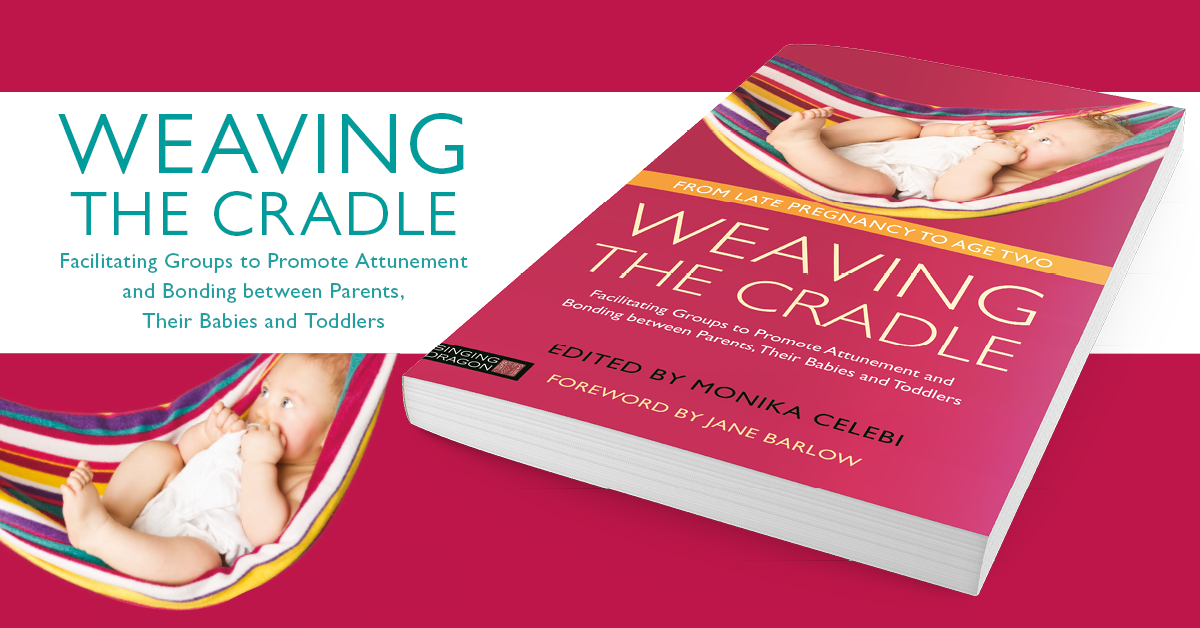Over the last year I have spent many hours editing and writing ‘Weaving the Cradle’, a book on facilitating groups to promote attunement and bonding between parents, their babies and toddlers. The book, whilst celebrating best practice, is a response to the harsh cuts in the social and health budgets in this country and abroad. It aims to raise awareness of the importance of infant mental health and to the great contribution parent-baby groups can make. It is my opinion that these groups should be available to all families who need and want them.
Research of the economic benefits of early intervention to support the mental and physical health of parents and babies is overwhelming (WAVE Trust with Department for Education 2013). Babies’ brain-architecture is formed in the crucial period of the 1001 Critical Days (Leadsom et al. 2014, Cross Parliamentary Manifesto). There are strong links between the babies’ environment, their relationship with the primary care taker (in most cases the mother), and their mental well-being. If the mother suffers, so usually does the baby (UNICEF, 2014). A stressful situation, such as moving house or a traumatic birth, can contribute to the development of depression. A depressed mother, who is also isolated, will struggle to fully engage with her baby. This parent may interact less, or be less friendly to her baby, or feel terribly guilty for having ‘bad’ thoughts. Studies put the percentage of women with mild to moderate postnatal depression or emotional difficulty within the first year at 20 – 30 % of mothers. Fathers, by the way, can get depressed too. There are also clear links between babies’ early experiences and later educational achievements (WAVE Trust, 2015).
What is heartening is that even one good enough relationship can increase a child’s resilience to stress and adversity. Therapeutic parent baby groups are brilliant vehicles to generate support, empathy, attunement and joy, as they activate all participants on many different levels. These pleasant, welcoming and safe environments allow the development of good relationships, even if there has been a difficult start, or there are adverse circumstances in the present.
For instance, one chapter in ‘Weaving the Cradle’ describes a community project in a relatively poor neighbourhood in Bristol, where the skills of a dance movement psychotherapist helped to create a community for new parents through movement and dance. Other chapters focus on different environments and the opportunities to form relationships within them, such as the everyday of a baby clinic at a general health centre. There are examples from NHS mental health services, children centres, inner city multi-ethnic boroughs in the UK, and shantytowns in Africa, projects in Tajikistan and in New Zealand. A variety of methods, from baby massage, video interaction guidance to psychotherapeutic interventions illustrate this important work.
What is striking is that all the different authors/clinicians converge around the central themes of supporting professionals and parents to generate compassion, respect, hope and acceptance, and the importance of mentalizing, reflecting and articulating what may be the baby’s experience (Fonagy, Gergley, Jurist, Target, 2002; 2006, Shai, 2011), which is at the heart of developing healthy relationships.
‘Weaving the Cradle’ is a call to arms for more investment in the field of infant mental health and to train more professionals to facilitate therapeutic parent baby groups, make them more widely available and so invest in the future.
June 12th-16th will be Infant Mental Health Awareness Week, so please talk about this important subject with your friends, families and colleagues.
Click here to read more about Weaving the Cradle.
If you would like to read more articles like this and hear the latest news and offers on our books, why not join our mailing list? We can send information by email or post as you prefer, and please also tell us about your areas of interest so we can send the most relevant information. You can unsubscribe at any time.
References
Celebi, ed. (2017) Weaving the Cradle – Facilitating Groups to Promote Attunement and Bonding between Parents, Their Babies and Toddlers, JKP, London, Philadelphia
Fonagy, Gergley, Jurist, Target, 2002; 2006, Affect regulation, Mentalization and the Development of Self. Other Press
Leadsom, A., Field, F., Burstow, P. and Lucas, C. (2014) The 1001 Critical Days: The Importance of the Conception to Age Two Period. Available at: http://www. andrealeadsom.com/downloads/1001cdmanifesto.pdf (Accessed: 1 December 2016).
Shai, D. and Belsky, J. (2011) ‘Parental embodied mentalizing: let’s be explicit about what we mean by implicit.’ Child Development Perspectives 5, 3, 187–188.
UNICEF (2014) New Insights into Brain Development: A Conversation with Dr. Jack Shonkoff. UNICEF, 24 April 2014. Available at: https://youtu.be/QvvZ98N6HsE (Accessed: 8 December 2016).
WAVE Trust in collaboration with Department for Education (2013) Conception to Age 2 – The Age of Opportunity. Addendum to the Government’s Vision for the Foundation Years: ‘Supporting Families in the Foundation Years’. Available at: http:// www.wavetrust.org/our-work/publications/reports/conception-age-2-age- opportunity (Accessed: 1 December 2016).
WAVE Trust (2015), Building Great Britons. Available at: http://www.wavetrust.org/ our-work/publications/reports/building-great-britons (Accessed: 5 December 2016).

3 Responses